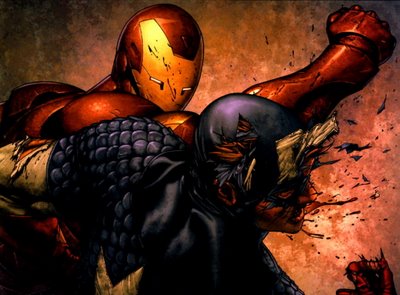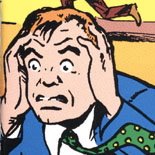Fixing Civil War
I was enjoying Marvel's Civil War. The basic premises, a conflict between security and individual rights played out as a literal battle between established superheroes, and how honorable people can end up violently disagreeing over important issues, are very strong and the art is very pretty. However, there have been MAJOR problems that have turned me off the whole thing.
And it didn't need to be that way. Here's how I would solve the problems of Civil War. (Nope, no hubris here).
1. The production delays. Yes, these are a problem. And whether by delaying the whole series until the late summer, to give Steve McNiven more time to draw, or calling in a fill-in artist, or simply not delaying other major titles so as not to spoil the shocking, shocking (ultimately, not that shocking) reveals, the delays should have been anticipated and dealt with. Personally, I would have disentangled it from the Marvel universe proper until it was resolved or almost resolved.
2. More to problems in the story itself, I'd make the Superhero Registration Act damned specific. Right now it's a vague mess. And if the debate is security vs. privacy, which it should be, the law should be a strongly enforced anti-vigilantism law, because, honestly, if you're using your mutant powers to bake cupcakes, who cares, but if you're just a regular joe using M-60s to mow down Mafia goombas, I think the police would like a word with you. Then the debate becomes whether superhumans have the right to take the law into their own hands without accountability to the public, and then, if you agree that they need to be watched, well, quis custodiet ipsos custodes?
3. As a corollary, the opening incident needs to be the direct result of the superhero committing a crime in the name of justice, and innocent people dying because of it. As it stands now, the New Warriors, funded by a television company and being documented by their own news crew, failed to stop a bad guy from killing lots of people. It is hard to see how the New Warriors could have been MORE public and MORE accountable, considering most of them died trying to save lives and there is still a major corporation that can be sued for damages, and being restrained by the law would NOT have prevented the explosion.
If I were writing Civil War, the Stamford Incident would have been caused by any of Marvel's monstrous or murderous anti-heroes beating Nitro to death, releasing his explosive energy in a civilian setting. In my dream scenario, it's Ghost Rider, who uses his penance stare to make Nitro go boom, so that only he remains in the burnt out field, charred bodies all around him. (Now he has to lam it on his bike every time the super authorities catch up with him, but can he out run his own guilt? But that's my pitch for a GR ongoing, and I digress...) So instead of heroes dying before they can prevent a mad man from killing, we have an immortal demon chasing vengeance regardless of the human cost... and THAT could get some people talking about new laws and new enforcement.
4. Captain America is the conscience of the Marvel Universe. Once he picked a side, it was all over. So I'd switch Captain America's and Spider-Man's positions, making Spider-Man the anti-reg leader and Cap the conflicted supporter/patsy of Iron Man. Yeah, it's America torn by Civil War, but even with the cliché, it works. It also makes more sense that Tony Stark would court his old friend and long-time ally, the universally beloved World War II hero Steve Rogers, to be the face of his campaign, rather than the publicly reviled Spider-Man, who Tony Stark may have worked with before but barely knows. And I could imagine Cap. America, Iron Man, and Reed Richards (the daddies of MU) making a good case that the kids can't just run around breaking things unsupervised.
It also puts Spider-Man in a more interesting position. More than anyone else (except maybe Matt "Daredevil" Murdock) Spider-Man knows the dangers of having his identity exposed. At the same time, Peter is hardly used to working on a team. What will he do when he has the power and responsibility of leading others into battle? Is openly flaunting a law putting his family in less danger or more? It also opens up class questions (Rich (Iron) Man/Poor (Spider) Man) and age gap issues.
5. I wouldn't put all the assholes on one side. The pro-registration side could have a very strong case, if they were not also so into throwing their friends into concentration camps, hiring mass murderers to hunt down people who have broken no laws but disagree with them, and play Odin by trying to clone gods. Not that superheroes can't make mistakes or be wrong, but shouldn't both sides be guilty of doing terrible things? Wouldn't it make more sense for the side without public and government support to be doing the more desperate, ethically questionable things? (so far, the worst thing they've done is let the Punisher save Spider-Man's life).
6. And less "shocks". The conflict is strong enough to carry seven issues without reveals like Thor, Clone of Thunder, the all new Suicide Squad Thunderbolts, and Dark Speedball. All that does is distract from the main idea, the underlying moral conflict. I know it's the major crossover, tying into tons of books and launching more than a few series, but the story would be better served by paring down the "moments" and leaving more space for character work and emotional beats.
So, to re-cap,
1. Cut it off from the rest of superhero books, for now.
2. Clarify that the debate is over vigilantism, and who watches whom.
3. Have the catalyst explosion be caused by over-zealous, not incompetent, super "heroes."
4. Put the moral center of the universe in the center of the conflict.
5. Morally compromise both sides, especially the less powerful side.
6. Get rid of the stupid stuff.
Oh, wait, that's Kingdom Come.






